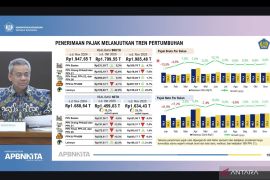The most dramatically increasing threats right now is poaching and the illegal trade."Nairobi (ANTARA News/Xinhua-OANA) - The head of the UN Environment Programme (UNEP) on Monday (3/3) called for global efforts to raise the publics environmental awareness and to curb illicit trade involving wild animals and their products, which is now at 19 billion U.S. dollars each year and rising.
In an exclusive interview with Xinhua on the occasion of the first World Wildlife Day, which falls on Monday, UNEP Executive Director Achim Steiner said the day marks both "a celebration and opportunity."
In December last year, the UN General Assembly decided to proclaim March 3 as World Wildlife Day, calling on the world to use the occasion to celebrate and raise awareness of the worlds wild fauna and flora.
The UNEP chief emphasized that it is imperative to "draw public awareness to not only wildlife, but also plant and animal life, and the biodiversity of our planet."
"The most dramatically increasing threats right now is poaching and the illegal trade," said Steiner, adding that there has been an escalation in terms of scale the violence involved in poaching on the African continent.
Around 1,030 rhinos and some 38,000 elephants are now left in Kenya, where the UNEPs headquarters locates. The countrys wildlife authorities said it lost at least 59 rhinos last year. Elephant population on the continent is estimated at 500,000, compared with 1.2 million in 1980.
A recent INTERPOL report said they had made 18 seizures accounting for some 41.6 tonnes of ivory in 2013, an all-time global high.
Financial reason is the main force behind increasing poaching and illegal trading, according to Steiner, saying that individuals in African countries often turned to poaching for money, and officials can be corrupted.
He reiterated that the economic value of wildlife in Africa is underestimated in many countries national accounting systems.
Loss of habitat is also a major contributor, Steiner said. "Human population has grown from 1 billion in 250 years ago to now 7 billion. We are in a major competition with wildlife in terms of sharing the land."
Elephants in Africa are threatened by the increasing loss of habitat in around 29 percent of their range areas, and the figure could rise to 63 percent by 2050, according to Elephants in the Dust, a UNEP partner.
The UNEP said more action is urgently needed to curb the situation, including strengthening law enforcement, building adequate human and financial capacity, raising public awareness, and fighting collusive corruption, as well as supporting national legislation and curbing demand for wildlife products.
It also called for longer-term considerations on natural resource management and sustainable economic development.
The UNEPs executive director sees the importance of raising the ordinary peoples awareness. "That is something that requires not only legislation, not only security interventions, it requires also public awareness."
"We need people to know that when you buy a piece of ivory that is illegally traded, you are directly contributing to threatening the survival of that species," Steiner said.
On Chinas efforts to protect the environment, Steiner recalled some of the events on the protection of wildlife and the environment he participated in China, saying "China has done a great deal already over the last twenty years since it joined the Convention on International Trade in Endangered Species."
Chinas forestry authorities have decided to set up a nationwide campaign to promote the World Wildlife Day and the environment protection.
"I think we should be very clear there is no issue in principal about Chinas commitment to stop this illegal trade," said Steiner.
He sees great potential in Chinas cooperation with African countries. "China is making tremendous contribution through cooperation with its African partners to strengthening the continents capacity to maintain its wildlife heritage for all of us."
"Tourism is expanding significantly between China and Africa, "Steiner said, calling for efforts to "make that passion for wildlife in peoples hearts rather than in peoples wallets."
According to a World Bank report released in October last year, Africa attracted 33.8 million visitors, up from a low 6.7 million visitors in 1990, and its receipts from tourism for the same year amounted to over 36 billion U.S. dollars, or 2.8 percent of the regions Gross Domestic Product (GDP).
The report say Africas tourism revenues are rising fast and are set to contribute more and more to world activity.
(U.C003)
Editor: Priyambodo RH
Copyright © ANTARA 2014












